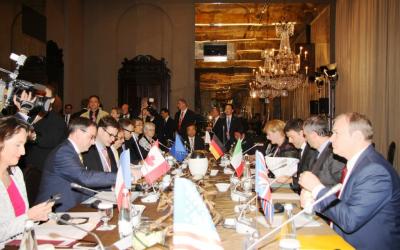Security at core of G7 Energy ministers' summit

ROME-Strengthening a common energy policy on a worldwide scale in order to ensure a diversified, reliable, and economically sustainable energy supply was the goal of the summit of G7 Energy Ministers which climaxed Tuesday in Rome, also joined by the European Commissioner for Energy and the Executive Director of the International Energy Agency.
The conclusions of the summit, chaired by the Minister of Economic Development, Federica Guidi, will be submitted to the oncoming Summit of Heads of State and Government, next June in Brussels.
Discussions went on in the presence of the Heads of Delegation of the 7 Countries: French Minister of Ecology, Sustainable Development and Energy Ségolène Royal, German Federal Minister of Economic Affairs and Energy Sigmar Gabriel, British Secretary of State for Energy and Climate Change Edward Davey, US Secretary for Energy, Ernest Moniz, Japanese Minister of Economy, Trade and Industry, Toshimitsu Motegu, Canadian Minister of Natural Resources Greg Rickford. Also, the EU Commissioner for Energy, Günther Oettinger and the Executive Director of IEA, Maria van der Hoeven. Italian Prime Minister Matteo Renzi welcomed all on behalf of the Italian Government at the start.
“At the core of the agenda there is collective energy security and the necessary actions to ensure it,” underlined Federica Guidi in the course of the final press conference. The first part of the debate analyzed strategies to reduce energy dependency and its related risks, and saw seven ministers agreeing on the need to support diversification of primary sources, energy production, and dispatching technologies, with the commitment to energy efficiency and a wider use of sources alternative to hydrocarbons (i.e. renewable, nuclear, alternative fuels).
“Development and modernization of infrastructure,” said the Minister of Economic Development, “was the theme of the second part of the discussions, highlighting the need for more powerful and more integrated energy networks, capable of ensuring supplies even in the case of energy shocks. This means more interconnections between countries, development of new plants to produce, receive and dispatch Liquefied Natural Gas, widespread availability of smart grids and of efficient storage systems for electricity and gas.”
“The last theme addressed, again with the aim of ensuring energy security in view,” concluded Minister Guidi, “was how to harmonize policies and the regulatory frameworks regarding raw materials markets, the mechanisms of energy and CO2 price formation, the defense of competition, free access to markets and infrastructures and, finally, coherent systems of stimulus for renewable sources and energy efficiency.”
Among the main engagements, the G7’s ministers agreed to ask the International Energy Agency, in close relation with the European Commission, to present within six months options for individual and collective actions of the G7 in the field of gas security.
Moreover, working with institutions such as the IEA, the International Renewable Energy Agency and international financial institutions, G7 will supply technical assistance, including leveraging the private sector, and facilitate exchanges with Ukraine and other European countries seeking to develop their indigenous hydrocarbon resources and renewable energies, and improve energy efficiency.
France's Energy Minister SégolèneRoyal said that the G7 would use the crisis over Ukraineto "speed up access to new technologies for countries that are excessively dependent.”On her side, Italy’s Federica Guidi called for the expansion of LNG plants in Italyas well as "low-carbon technologies." Britain's energy secretary Ed Davey said participants agreed on the need to "disarm the Russian energy weapon." Reducing Western Europe's dependence could, however, take years, he acknowledged. The Summit’s conclusions will be submitted to the oncoming G7 next June in Brussels, also with the aim of contributing to the discussion on climate change that will take place at the 2015 Paris Conference.


